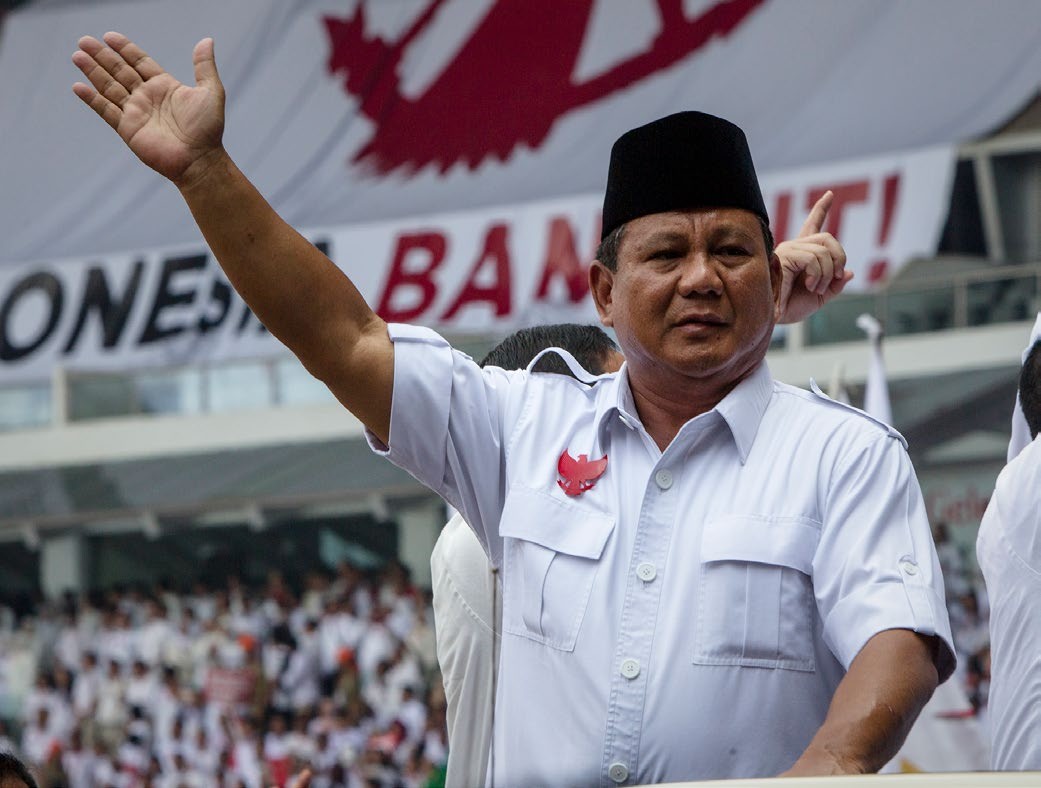By Jane Lewis
Copyright moneyweek

Try 6 issues free
View all Investing
Stocks and Shares
Commodities
Personal Finance
Personal Finance
Personal Finance
Personal Finance
View all Personal Finance
Bank accounts
Credit cards
View all Economy
Global Economy
MoneyWeek quizzes
Spending it
On this day in history
Latest magazine issue
MoneyWeek glossary
Newsletters
Newsletter sign-up
Manage my newsletters
Latest newsletter
Newsletter sign up
Inflation live
MoneyWeek quiz
£560 state pension rise
Prabowo Subianto: Indonesia’s Deng Xiaoping
Prabowo Subianto, like his Chinese hero, is taking power in his 70s with big ambitions for his country. Yet many view his return to politics with dread
Newsletter sign up
When you purchase through links on our site, we may earn an affiliate commission. Here’s how it works.
Prabowo Subianto during an election rally in Jakarta, Indonesia. (Photo by Oscar Siagian/Getty Images)
(Image credit: Getty Images)
Jane Lewis
20 September 2025
in Features
At private dinners with family and confidants, the Indonesian president, Prabowo Subianto, often speaks admiringly of historical figures such as Abraham Lincoln, Nelson Mandela and Mahatma Gandhi, says Bloomberg. “Yet one name stands above the rest.”
Prabowo’s hero is the late Chinese leader Deng Xiaoping, whom he “reveres both for breaking with party orthodoxy to propel China’s economic miracle and for his resilience – cast aside for years, yet taking power at the age of 74”.
For Prabowo, 73, the similarities with his own biography are striking. An ex-special forces commander, who went into self-imposed exile after the fall of dictator Suharto (his father-in-law) in 1998, he views himself as a “transformative” figure – vowing at his election last year to get the country’s growth back to 8%, while rolling out a raft of popular policies, including a $28 billion free-school-meals programme.
Subscribe to MoneyWeek today and get your first six magazine issues absolutely FREE
Get 6 issues free
Sign up to Money Morning
Don’t miss the latest investment and personal finances news, market analysis, plus money-saving tips with our free twice-daily newsletter
Don’t miss the latest investment and personal finances news, market analysis, plus money-saving tips with our free twice-daily newsletter
Yet for many of his compatriots, Prabowo’s return inspired dread, says Al Jazeera. “A general once feared across Indonesia and banned from the US” for abductions, torture and other human-rights abuses “has reinvented himself as a ‘cute grandpa’”.
Prabowo’s electoral campaign to woo voters might have worked, but economically things are not going to plan, says the Financial Times.
At the end of August, simmering tensions in the Southeast Asian country erupted into violence when mobs stormed and looted the homes of four parliamentarians, including that of finance minister Sri Mulyani Indrawati. Within a week, she was jettisoned – prompting shockwaves in local markets. Having served in the role for 14 of the past 20 years, the former managing director of the World Bank was “a widely respected technocrat seen by investors as a guarantor of basic economic orthodoxy”. Alarmingly, her dismissal came just as Indonesia’s central bank signed a “burden-sharing” agreement with the government to help finance its sweeping projects – a worrying blurring of boundaries. The new “hurriedly sworn in” finance chief doesn’t inspire much confidence either, says Bloomberg.
When Purbaya Yudhi Sadewa got the call summoning him to the presidential palace, he initially thought it was “a prank”.
Although an able economist, he is not in Sri Mulyani’s class. Perhaps his best calling card, from the perspective of his new boss, is that he is a self-proclaimed supporter of the ideas of Prabowo’s father Sumitro Djojohadikusomo, who was a finance minister in the 1950s and a trade minister in the 1970s. “Sumitronomics”, as he once explained, is all about achieving political and social stability “through the equitable distribution of gains”.
Prabowo Subianto: democracy is ‘messy and costly’
Prabowo, whose own fortune is put at about $127 million, isn’t short of a bob or two and has enjoyed a lifestyle to match. He owns a mansion on the outskirts of Jakarta and “a guarded mountain retreat” in West Java, says Al Jazeera.
His current wealth derives from going into business with his brother, Hashim Djojohadikusomo, when he was expelled from the military – the family interests span paper pulp and plantation companies as well as oil, gas, coal and palm oil.
Prabowo was raised in an elite and cosmopolitan environment, notes the New Straits Times: spending time in Switzerland, Singapore, Malaysia and later in London. Returning home in 1970, he enrolled in the Indonesia Military Academy and went on to join the elite Kopassus unit under Suharto.
Prabowo feels “comfortable on the world stage”, but he’s no fan of democracy, once saying that it is “tiring” and “messy and costly”, says The Conversation. “Suharto’s system was based on a Faustian bargain that allowed him to rule corruptly and oppressively in return for high economic growth and development.” Prabowo could well adopt the same approach.
This article was first published in MoneyWeek’s magazine. Enjoy exclusive early access to news, opinion and analysis from our team of financial experts with a MoneyWeek subscription.
Sign up for MoneyWeek’s newsletters
Get the latest financial news, insights and expert analysis from our award-winning MoneyWeek team, to help you understand what really matters when it comes to your finances.
Contact me with news and offers from other Future brandsReceive email from us on behalf of our trusted partners or sponsorsBy submitting your information you agree to the Terms & Conditions and Privacy Policy and are aged 16 or over.
Social Links Navigation
Jane writes profiles for MoneyWeek and is city editor of The Week. A former British Society of Magazine Editors editor of the year, she cut her teeth in journalism editing The Daily Telegraph’s Letters page and writing gossip for the London Evening Standard – while contributing to a kaleidoscopic range of business magazines including Personnel Today, Edge, Microscope, Computing, PC Business World, and Business & Finance.
She has edited corporate publications for accountants BDO, business psychologists YSC Consulting, and the law firm Stephenson Harwood – also enjoying a stint as a researcher for the due diligence department of a global risk advisory firm.
Her sole book to date, Stay or Go? (2016), rehearsed the arguments on both sides of the EU referendum.
She lives in north London, has a degree in modern history from Trinity College, Oxford, and is currently learning to play the drums.
8 of the best properties for sale with orangeries
From a converted Victorian Catholic school with a chapel in Kingston Upon Thames to a 12-acre country estate with mature gardens and a lake in Nantwich, Cheshire, we look at some of the best properties for sale with orangeries
Should you invest in Hansa Investment Company?
William Salomon has finally brought the two trusts he controls together. Should investors buy in?
You might also like
Is Britain heading for a big debt crisis?
Things are not yet as bad as some reports have claimed. But they sure aren’t rosy either, says Julian Jessop
‘Labour’s failure on house building is turning into a national emergency’
Labour’s plans on house building are not working out and it’s not hard to work out what has gone wrong, says Matthew Lynn
Britain’s migration crisis
Public concern over immigration is at the highest level since polling company Ipsos first started asking about the issue. So what’s being done about it?
‘Ride the recovery in emerging markets’: Gustavo Medeiros of Ashmore Group tells MoneyWeek
What’s the outlook for emerging markets? Gustavo Medeiros, head of research at Ashmore Group, gives his analysis and reviews progress in developing economies
Giorgio Armani: the irreplaceable Il Signore
Giorgio Armani started his fashion business in 1975 and built it into the world’s largest private luxury brand. Where can it go without him?
‘The City’s big bet on green finance fails to pay out’
Insurers and banks are backing away from “green finance”, and there is not much sign of the green boom we were promised. That’s a problem for the City
Why is English football thriving – and can it last?
What has gone so right for English football? The national team has found its feet; the Premier League is swimming in money and profits are soaring
Should you invest in Pakistan – the Vietnam of South Asia?
If Pakistan is now serious about reform, it’s time for investors to buy, says Maryam Cockar
View More \25b8
Useful links
Subscribe to MoneyWeek
Get the MoneyWeek newsletter
Latest Issue
Financial glossary
MoneyWeek Wealth Summit
MoneyWeek Live Reports
Most Popular
MoneyWeek share tips
MoneyWeek savings stories
MoneyWeek tax stories
Contact Future’s experts
Terms and Conditions
Privacy Policy
Cookie Policy
Advertise with us
MoneyWeek is part of Future plc, an international media group and leading digital publisher. Visit our corporate site.
Future Publishing Limited Quay House, The Ambury,
BA1 1UA. All rights reserved. England and Wales company registration number 2008885.



